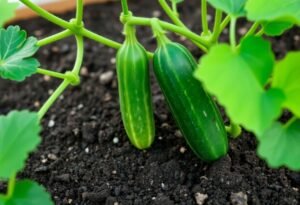Why is Cucumber Fertilization So Important?
Fertilization is extremely important for cucumbers because it provides essential nutrients. Like many plants, cucumbers require various macro and micronutrients to grow properly. When your soil lacks nitrogen, phosphorus, or potassium, cucumber fertilization becomes key. With the right fertilizer, plants will be stronger, translating into better yields and tastier fruits.
Best Fertilizers for Cucumbers
When selecting fertilizers for cucumbers, consider both organic and synthetic options. You can begin your cucumber fertilization journey with compost, which enriches the soil with necessary micronutrients. Additionally, fertilizers like manure or granulated organic fertilizers are excellent choices. Pay attention to fertilizers rich in nitrogen, which support leaf growth—crucial for healthy plant development.
Timing and Method of Fertilization
The right timing for fertilizing cucumbers is just as important as the fertilizer choice. Typically, you’ll want to fertilize twice during the growing season—at the beginning of growth and during the fruiting period. Cucumber fertilization can be applied in both solid and liquid forms, depending on the gardener’s preference. It’s important not to overdo it, as excess fertilizer can harm the plants.
Assessing Fertilization Needs
One of the first steps in cucumber fertilization is to assess your soil’s condition. You can do this by conducting a soil test to determine what nutrients are lacking. Based on the test results, you can tailor the type and amount of fertilizer needed. Remember, not all soils are the same, so individual assessment is critical to success.
The Impact of Soil pH on Cucumber Fertilization
Soil pH plays a vital role in nutrient absorption by plants. The optimal pH for cucumbers ranges between 6 and 7. If your soil is too acidic or alkaline, the effectiveness of cucumber fertilization may be greatly reduced. Therefore, it’s wise to regularly check your soil’s pH and make adjustments as necessary.
Mulching as Part of Fertilization
Mulching is an excellent way to support cucumber fertilization. A layer of mulch not only helps retain moisture in the soil but also gradually releases nutrients that promote healthy plant growth. Additionally, mulching assists in weed control, providing another great benefit.
Proper Care After Fertilization
After fertilization, it’s crucial to care properly for your plants. Regular watering is necessary to ensure that nutrients reach the roots. Cucumber fertilization without proper plant care will not yield the expected results, so consistency is key to success.
Conclusion
Managing cucumber fertilization is key to success in your garden. Remember to adapt your fertilization strategies to meet the specific needs of your plants and soil quality. By using the right fertilizers at the right time, you can ensure abundant harvests and delicious fruits. Don’t wait—dive into cucumber fertilization and savor the rewards of your labor!
Disclaimer
The tips provided are for informational purposes only. It is advised to consult with an agronomist or gardening expert before using specific fertilizers.

















